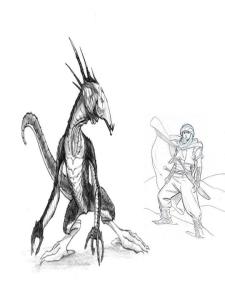
“I do not consider myself less ignorant than most people. I have been and still am a seeker, but I have ceased to question the stars and books; I have begun to listen to the teachings my blood whispers to me.”
-Emil Sinclair, Demian by Hermann Hesse
Autumn was always the most dismal time. As if God himself had cracked the umbral sky with his tears, melancholy drops callously pounded against the windows of the study. Confined behind the fogged glass, Decebal fidgeted with the collar of his shirt. His brief excursion outside, merely from his car to the foyer, had left his fingers feeling icy. The heated skin of his neck made that feeling even more pronounced, and caused a singular shiver to cascade down his body. A banged up, unsightly grey piece of craftsmanship that functioned as his toolbox was at his side, condensation pooling on the red cherry wood of the floor beneath it.
Decebal fixed clocks for a living. He had been coming to this house in particular for decades, and it was always the same. Between the rain and the mud, he couldn’t cross the driveway without feeling like an old kitchen rag in a mop bucket. In the end though, he couldn’t complain. In a world of digital beepers and electric slats, his profession was a dying one. Yet the owner of this mansion, a Mr. Marius Graenger, delighted, near obsessively, with an artistic collection of grandfather clocks. There was not a single room, hall or stairwell that was not in some way influenced by the presence of their antique faces. Their ticks, tocks and the creaks of gears drowned out the silence in mechanical, maniacal chorus. Decebal imagined that for an average guest, the incessant echo of pendulums might be a little disconcerting. To Decebal, the sound of constancy was a creature comfort, and a decent reminder of who paid the bills.
There were always those days, though, where the timed rhythm in the halls grew weighted and the air thick, making Time’s own metronome struggle to cut through it. Today was like that; the pendulums were rocking in slowly diverging paces, like the race and quiet of a heartbeat. The estate was too large to be so still. The dark cherrywood floors, lacquered from a century of polishing, protested the weight of his feet as they shifted in cracked, aged whines. Every now and then he heard the voices of the staff carry through the wings.
The Graenger mansion had once been a monastery. It had been converted in the late 1900s by Mr. Marius’s great grandfather. An architectural marvel, it was listed in the provincial books as a heritage site, and thus, the contractors hadn’t altered too much of its original blueprint. On the western slope of the estate was a belfry, which was in turn connected to an extended network of basement rooms. The belfry’s bricks were stained with lichen and various other molds and mosses. Decebal often got the impression of a painting when he stared at them long enough. The bells were long gone, of course, and all of the entries above ground had been sealed off, but the basement was still quite accessible. It was here he usually had to go to adjust the clocks in Mr. Graenger’s son’s room. Under usual conditions, he had a tight reign on his imagination, yet he could not ignore the feelings of trepidation that filled his breast when going down those stairs. At times, it felt like he was falling into a strange abyss from whence there could be no return. The stains of rust on the iron and wood steps loomed like ghosts from the darkness when they caught a certain shade of light.
Naturally, to be in the service of Mr. Graenger for so many years, Decebal had heard quite a bit about his employer’s life. Live-in help, he knew not what to call these modern maids, often gossiped as they treated him to a cup of tea to warm his hands before work. They often spoke of the retired statesman and his trophy wife, though as far as the staff was concerned, the two had been divorced for many years. Between them, they had only one child, a boy named Remus, who hardly ever left the house. The child was about eleven now, and not the most pleasant company. Young Remus’s disposition reminded Decebal of the foul stenches of bogs in the summertime; the boy’s only redeeming quality was that he was severely emaciated from anemia, and thus not able to throw tantrums for an extended length of time. The boy’s sour attitude, coupled with the dank quality of the room, made the few times that Decebal had gone to maintenance the clocks there an exercise in haste. He did not know whether Remus’s aura was what made the room so gloomy, or if it was the other way around. All that mattered to the time-smith when he was there was to finish and be on his way as quickly as possible. He honestly couldn’t fathom why Marius would wish to keep his son in the dank cellars a story beneath sodden earth. It was a living coffin.
The maids, of course, had rumors to explain it. The truth of the matter is, as Natalie would say, is that long before Remus was even born, Marius and his trophy wife started living separately. The statesman was known to be something of a boor, and despite the staffers’ best efforts to hire elder women or simply men, there was an occasion here and there when a pretty young woman made her way into their midst. One of these ladies was an Irish girl named Evette. By Decebal’s own count, she had only worked for Mr. Graenger for two years, but then, he was not at the house often enough to know. One day, he had actually had the misfortune of passing the study he stood in now, only to find the statesman jeering the hapless maid.
Decebal was certainly not a confrontational man, but since he had seen the two of them, and they he, he could not simply abscond to another area of the house and pretend it hadn’t happened. Marius had quickly excused himself, leaving Evette alone with Decebal in moments that would come to be remembered as practically separated from time. He didn’t want to get involved. There was a moment, however, when their eyes met as they passed each other. The green of her eyes was startling; the very act of looking upon them made Decebal’s blood run cold. For a single moment, he ceased to know anything but that haunting stare, and the distress that stirred like worms under its surface. The next year, when Decebal returned to calibrate the clocks, Evette was gone and young master Remus was two months old. The reasons for her absence had been unresolved. Decebal had heard things from she’d run off with a stable-boy to the far more likely that she’d gone into hiding after giving birth to Marius’ illegitimate child. Apparently, no one had ever come looking for her.
He did not know why, almost a decade later, he found himself thinking about the soft-skinned redhead. It was as if he were back in that moment, caught in her serpentinite gaze all over again. Where was she now? Did she miss her son, if Remus was indeed her child? He cradled the cup of tea the maids had given him in his hands, carefully turning the lightly chipped china. Perhaps even her name slipped passed his lips as he thought of that day and the way Marius’s hands had claimed Evette’s own with such terrible authority- how her own slender body had trembled in what Decebal would like to assume was fear. He sighed, imagining how the swell of her young breasts must have looked under the navy blue costume she had been wearing.
His mind was lulled back into that precarious memory, frayed at the edges due to the great leagues of time that had passed. As he looked out the window steamed by his breath, he thought he could see Evette in her gay little dress, perhaps a little moth-bitten, in this very room- pushed to the bookcase by Marius’ predatory leer. His hands fell to his heart, checking for the quick pace Evette’s would have adopted while Marius took from her youthful body, and how the illness that followed would linger on for months, until it was clear what she carried inside her. He could almost sense the swell of life in the mother diminishing, damaging her and her unborn, until what she birthed was monstrous, hardly human. His stomach felt cold.
Taking a hand to wipe the sweat from his brow, Decebal paused, looking into his half-empty cup, the tea now cold. The child would have been born out of sight and sound, in the cellars. Yes, perhaps in the very room Remus now occupied. Evette wouldn’t have been able to stand the silence she had been forced to keep. It would gnaw at her and she would seek escape. It wouldn’t do for Marius, who was still married and not yet retired from office. This mansion was miles from the nearest town; for even a few hours of work, Decebal often had to stay the night. Marius would force her into silence. He would make her stay.
Looking at his cup now, he watched, mesmerized, as his fingers gripped the porcelain in a stranglehold, squeezing that fragile china like a neck. Yes, Evette, in her unfortunate luck, was far too dangerous to be kept alive. Marius would wait for the rains, like today, when there were few visitors, and dispose of her. But where could he hide the body?
Unbidden, uncalled, Decebal found his memory latching on to the red iron stains of the belfry stairs. He saw, too, places he had never been. Thick, rat-bitten ropes and gears. His mind filled in the blanks as if he had been there himself, as if he had every reason to belief their truth.
Startled, Decebal pulled himself out of such dark, terrible thoughts. His hands were sweaty, his heart was pounding, and adrenaline was making the very tips of his fingers tingle in frantic energy. What had he been thinking? He was too bewildered to even consider that he had gone into something totally of his own creation, in which he played the bastardly part of Marius, imagining the very death of a girl that had merely gone missing. He put his teacup to the side and rung the stiffness out of his hands. His body trembled from the chill of the room and, perhaps, the thoughts so unlike him. It took every ounce of his willpower to banish the image of Evette’s stare from his thoughts. Those dual greens remained defiantly branded on even the darkest recesses of his mind. Gradually, he began to hear the mechanical music from the halls again.
It was right then that the measured tune of those hundreds of clocks ceased, and there began a fantastic ringing of their chimes for the noon hour. Long calls, short calls, soft melodies and cuckoo birds of every flavor, Decebal’s eyes closed so he could listen. It was faint, but in their choir, he heard, rather distinctly, the grand tones of monastery bells. They reverberated through the halls, rising from depths of the earth and on through the rafters, gradually drowning out all else. Dong, Dong, Dong…

 Of Frogs and Lovers …
Of Frogs and Lovers …
 Chapter One
Chapter One 

